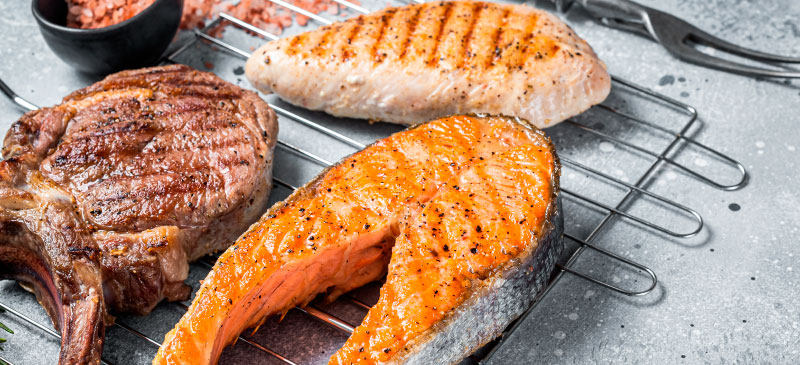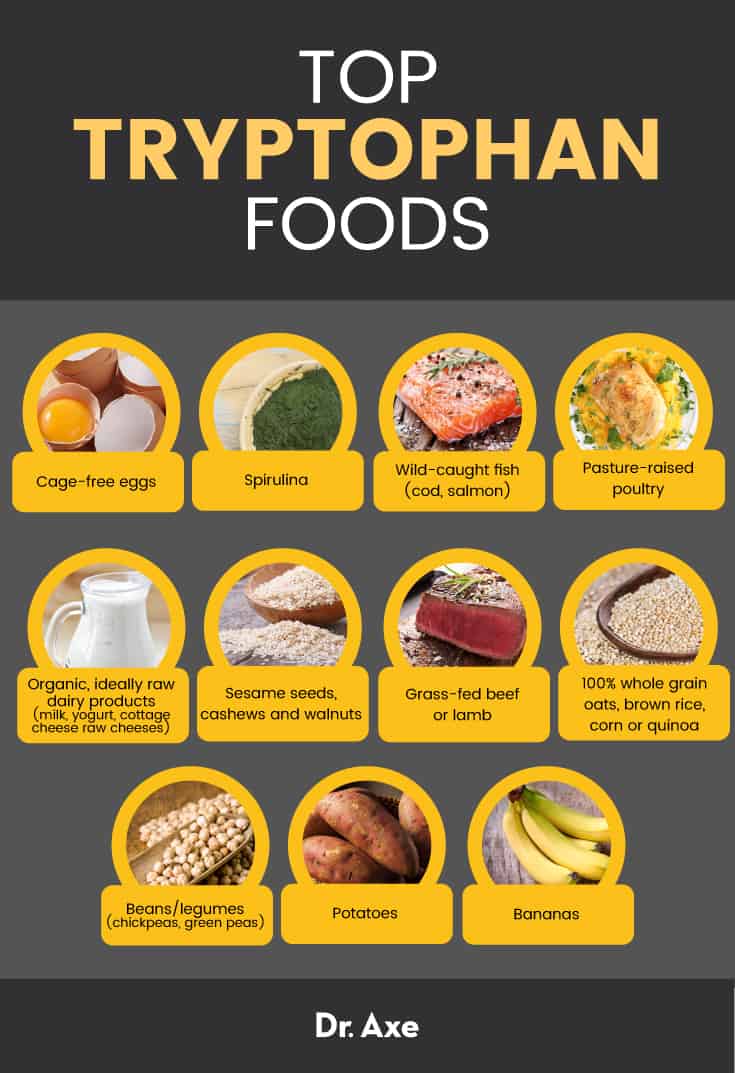
One of the things often overlooked when people are trying to improve their overall health, have more energy and sleep better is the importance of obtaining enough amino acids from different protein foods. Amino acids, including tryptophan, are the “building blocks of proteins,” and without a wide enough array of them in our diets, we actually can’t even survive, let alone thrive.
Of these amino acids, tryptophan plays an important role. In fact, eating tryptophan foods or taking supplements helps bring on natural calming effects, induces sleep, fights anxiety and can also help with ADHD. Tryptophan has also been found to stimulate the release of growth hormones and even reduce food cravings for carbohydrates in some cases.
What Is Tryptophan?
Tryptophan (also called L-tryprophan) is an essential amino acid that acts like a natural mood regulator, since it has the ability to help the body produce and balance certain hormones naturally.
An important byproduct of tryptophan is 5HTP (5-hyrdoxytryptophan), which works in the brain and central nervous system to boost feelings of well-being, connection and safety. It does this by increasing production of one of the body’s main feel-good hormones: serotonin. Serotonin is the same calming chemical released when we eat certain comfort foods like carbohydrates, which is why supplementing with tryptophan has been shown to help control appetite and contribute to easier weight loss or maintenance.
Serotonin works by transmitting signals between nerve cells and altering brain functions that affect mood states and sleep. In fact, supplementing with 5HTP (made from tryptophan) has been shown to lower depression symptoms as well as many prescription medications can.
Amino acid therapy is somewhat of an emerging field, which is based on the fact that certain amino acids have been found to be very helpful with treating conditions like sleep disorders, depression, fatigue, anxiety and sexual dysfunctions. The best part about using targeted amino acids to help resolve health conditions and ease symptoms is that they’re completely natural, require no prescription and the vast majority of the time cause no side effects whatsoever.
We must get all the essential amino acids (like tryptophan, histidine, leucine and lysine, for example) through our diets since we can’t create on them on our own, but even other nonessential amino acids have many critical roles in the body.
Essential amino acids help the body produce the kinds that are nonessential, and together they’re important for building and repairing muscle tissue, helping with neurotransmitter functions, supplying the brain with enough energy, and balancing blood sugar levels, for example.
Benefits
1. Helps Improve Sleep Quality
There’s evidence that tryptophan has natural sedative effects that can help you sleep better, and as a result it can help improve overall health. A lack of sleep is a risk factor for problems like depression, decline in motor coordination, reduced concentration and memory, muscle aches, weight gain, and more.
A 2022 study on tryptophan shows the supplement can aid better sleep and reduce the time it takes to get to sleep.
2. Helps Life Your Mood and Reduce Depression and Anxiety
Not only can tryptophan help you sleep more soundly, but studies have also shown it to be a natural mood lifter and offer protection against depression, anxiety and the numerous negative symptoms associated with high stress levels. Many studies have found that L-tryptophan converts to calming serotonin in the brain and helps make other essential amino acids more available, which in turn helps control someone’s moods and turn down production of stress hormones.
Some research indicates that reduced intakes of tryptophan can cause significant reductions in certain brain activities that promote happiness and that low serotonin levels are more common among people with anxiety and depression.
A 2016 study showed how higher doses of dietary tryptophan led to significantly less depression, irritability and anxiety among healthy participants. Importantly, the authors point out that this outcome differed from most existing research that relied on tryptophan supplements.
In addition, eating fewer tryptophan foods appears to cause more irritability and anxiety among healthy subjects when compared to when the same individuals ate more of a tryptophan-rich diet.
3. Reduces Headaches and Migraines
Studies have found that tryptophan depletion worsens pain associated with tension headaches and migraines, plus can cause aggravated nausea and sleep problems experienced by many migraine sufferers. Increased brain synthesis of serotonin seems to offer natural relief for headaches and migraine symptoms, including sensitivity to light, indigestion, pain and more.
READ RELATED: What Is Black Wheat? Read About The Health Benefits Of This Gluten-Free, Superior Wheat Variety
A 2019 study revealed that subjects who had a median intake of nearly 1 gram of tryptophan per day reduced their odds of developing a migraine by nearly 60 percent.
4. Helps Address ADHD Symptoms
In this 2016 study, the role of amino acids in the blood in relation to attention-deficit/hyperactivity disorder (ADHD) was examined. Because of their impact on the synthesis of serotonin and dopamine, it appeared that decreased concentrations of the amino acids tryptophan, tyrosine and phenylalanine in the blood may contribute to ADHD symptoms.
Indeed, it was shown that a depletion of dietary tryptophan impaired sustained attention in adults with ADHD; it even weakened behavioral inhibition in hostile ADHD children with ADHD.
However, supplementing with tryptophan led to a decrease of ADHD symptoms in children with ADHD.
How Much Tryptophan Do You Need?
There can be large differences in the actual needs of individuals when it comes to daily tryptophan intake. That’s because factors like someone’s age, weight/body composition, level of activity and digestive/intestinal health all affect how much is absorbed and used. In general, if you simply get amino acids from foods rather than supplements, you aren’t at risk for consuming too much tryptophan, although supplements can raise this risk.
Research suggests that most healthy adults consume around 3.5–6 milligrams of L-tryptophan per kilogram of body weight through their diets most days. If you eat enough calories in general, vary your intake of protein and plant foods, and aren’t dealing with an intestinal disorder, chances are you’re acquiring enough. However, you might benefit from consuming more if you notice signs of moodiness, irritability, fatigue and trouble sleeping well.
Tryptophan Foods
A benefit of consuming tryptophan from natural food sources is that this can help with absorption and also offer other benefits, such as providing other essential amino acids and healthy fats. Research shows that your diet can play a major role in helping you synthesize enough serotonin and controlling your moods, sleep and stress response.
Doctors now recommend that the best way to obtain tryptophan from your diet and take advantage of its benefits is to vary the sources of proteins and carbohydrates you eat, since this allows for the most serotonin to be produced overall.
One way to make sure you get enough tryptophan and other amino acids in your diet is to aim for having about 20–30 grams of protein with each meal, varying the types of high protein-foods or snacks you eat since different types offer different levels of amino acids. Both plant and animal foods provide tryptophan, but in general animal foods are a more concentrated and complete sources of all amino acids/proteins you need.
For the best results and strongest calming effects, combine the protein foods below with a small serving of unrefined carbohydrates (like potatoes, veggies, beans or even fruit) in order to help tryptophan cross the blood-brain barrier, where it can boost serotonin levels.
Some of the foods that provide the most tryptophan and help raise 5HTP/serotonin levels include:
- cage-free eggs (especially the whites)
- spirulina
- wild-caught fish like cod and salmon
- pasture-raised poultry (including turkey)
- organic, ideally raw dairy products, such as milk, yogurt, cottage cheese or raw cheeses
- sesame seeds, cashews and walnuts
- grass-fed beef or lamb
- 100 percent whole grain oats, brown rice, corn or quinoa
- beans/legumes, including chickpeas and green peas
- potatoes
- bananas

Risks and Side Effects
Because many protein foods cause tryptophan to have a lot of competition when it comes to selection and uptake in the brain, these foods don’t always raise blood plasma levels of serotonin as much as we might hope for.
For people struggling with mood disorders, insomnia or addictions, supplementing with 5HTP can be a good way to directly increase serotonin. Low doses should be taken at first, and you should look for out side effects, including nausea, diarrhea, drowsiness, lightheadedness, headache or dry mouth.
Tryptophan or 5HTP taken as supplements also have the potential to cause serotonin syndrome when combined with sedatives or antidepressants (such as MAOI or SSRI class drugs) so if you take any mood-altering prescriptions, don’t take tryptophan without first talking to your doctor.
Supplements also shouldn’t be taken by pregnant women, women who are breast-feeding, or anyone with active kidney or liver disease since this can cause complications.
Final Thoughts
- Tryptophan (also called L-tryprophan) is an essential amino acid that acts like a natural mood regulator, since it has the ability to help the body produce and balance certain hormones naturally. Supplementing with tryptophan-rich foods or taking supplements helps bring on natural calming effects, induces sleep, fights anxiety and helps with ADHD.
- Some of the best tryptophan foods include cage-free eggs, spirulina, wild-caught fish, pasture-raised poultry, raw dairy, sesame seeds, cashews, walnuts, grass-fed beef or lamb, whole grain oats, brown rice, corn, quinoa, beans/legumes, potatoes, and bananas.
Source:








